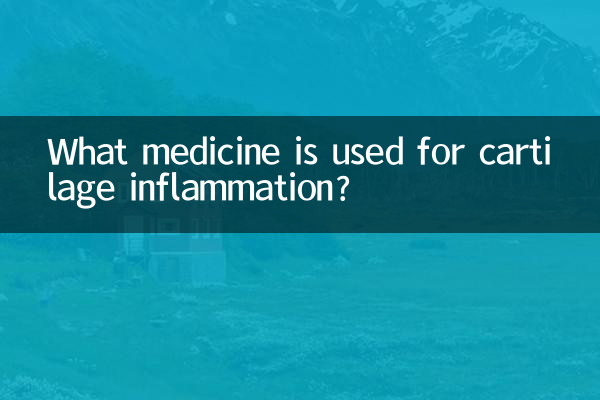What medicine is used for cartilage inflammation?
Cartilage inflammation is a common joint disorder that is often caused by joint injury, overuse, or inflammatory disease. For the treatment of cartilage inflammation, drugs are one of the important means. This article will combine the hot topics and hot content on the Internet in the past 10 days to give you a detailed introduction to the medication plan for cartilage inflammation.
1. Common symptoms of cartilage inflammation

Cartilage inflammation mainly manifests as joint pain, swelling, limited movement and other symptoms, which may affect daily life in severe cases. The following are typical symptoms of cartilage inflammation:
| Symptoms | Description |
|---|---|
| joint pain | Pain that worsens during activity and is relieved by rest |
| swelling | Redness and swelling around the joints |
| Restricted activities | Reduced range of motion of joints |
| stiff | Joint stiffness in the morning or after long periods of immobility |
2. Commonly used drugs for cartilage inflammation
Drugs used to treat cartilage inflammation mainly include nonsteroidal anti-inflammatory drugs (NSAIDs), chondroprotective agents, analgesics, etc. Here is a detailed list of common medications:
| drug type | Representative medicine | Mechanism of action | Things to note |
|---|---|---|---|
| Nonsteroidal anti-inflammatory drugs (NSAIDs) | Ibuprofen, diclofenac | Reduce inflammation and pain | Long-term use may hurt the stomach |
| chondroprotectant | Chondroitin sulfate, glucosamine | Promote cartilage repair | Need to be taken for a long time |
| analgesics | Acetaminophen | relieve pain | Not anti-inflammatory, excessive liver damage |
| topical medication | Voltaren ointment | Local anti-inflammatory and analgesic | avoid contact with wounds |
3. Adjuvant treatment of cartilage inflammation
In addition to drug treatment, symptoms of cartilage inflammation can also be relieved by the following auxiliary methods:
| Treatment | function | Things to note |
|---|---|---|
| physical therapy | Hot compress, cold compress, ultrasound | Cold compress in acute phase, hot compress in chronic phase |
| Sports rehabilitation | Low-intensity exercise strengthens muscles | Avoid strenuous exercise |
| diet conditioning | Supplement Omega-3 and Vitamin C | Reduce inflammatory response |
| weight management | Reduce burden on joints | Obese people need to lose weight |
4. Preventive measures for cartilage inflammation
The key to preventing cartilage inflammation is to protect joint health. Here are some suggestions:
1.moderate exercise: Avoid overuse of joints and choose low-impact sports such as swimming and cycling.
2.maintain a healthy weight: Reduce the burden on joints and reduce the risk of cartilage wear.
3.Eat properly: Eat more foods rich in antioxidants, such as dark vegetables and fruits.
4.correct posture: Avoid maintaining the same posture for a long time and pay attention to joint protection.
5. Latest research progress
According to recent popular medical research, the treatment of cartilage inflammation has the following new trends:
| Research direction | progress | Potential applications |
|---|---|---|
| stem cell therapy | Promote cartilage regeneration | clinical trial stage |
| biologics | Targeted inhibition of inflammatory factors | for severe cases |
| 3D printed cartilage | artificial cartilage transplant | Possible alternative to surgery in the future |
6. When Do You Need Medical Treatment?
If the following situations occur, it is recommended to seek medical treatment promptly:
1. Joint pain continues to worsen, affecting daily life.
2. The joints are obviously swollen, warm or red.
3. Accompanied by systemic symptoms such as fever and fatigue.
4. Medication is not effective.
Treatment of cartilage inflammation requires a combination of medications, lifestyle and complementary therapies. Rational use of medication and scientific care are the keys to relieving symptoms and protecting joint health. The content of this article is for reference only. Please follow your doctor’s advice for specific medication.

check the details

check the details